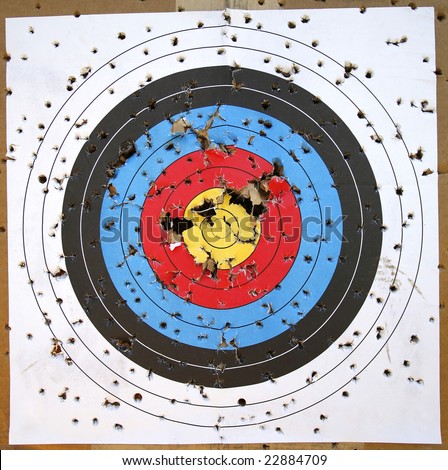If one has taken a logic or debate course, then one has heard of the 'bull's eye' fallacy. However, every where I go and every one I talk to has to be given a quick lesson to understand it.
This fallacy is promulgated in the media, on Facebook, and of course in politics by all sides.
All fallacies takes advantage of emotion and raw data to direct or sway an opinion.
Imagine a humongous 'old' west style barn. It has been standing for many years. Every year a cowboy comes out and fires many shots without aiming at the barn, just to let off some steam. After a few years he comes out with some paint, looks for an area where there is a tight grouping of many shots and paints a normal size bull's eye around that spot. When he has friends over, shows them the bull's eye, they are in awe and convinced that the cowboy is an expert marksman.
In our world, raw data is gathered concerning murders, school violence, political agendas, and other biased uses. Out of all data collected, whoever wishes to bias it, takes only the data that supports their views.
Then they draw a conclusion from just the data they have gathered, and then use that same data to back up their conclusion, making it appears that the data clearly and only supports their view. They step back and let everyone assume that the facts are speaking for themselves.
So, much like the cowboy gets everyone to ignore the other random shots and focus on the bull's eye. So, biased persons don't mention all the data that doesn't support their agenda, they allow everyone to believe that all the facts support their conclusion. In either case no one has lied, they just haven't revealed the truth!
How might I use this fallacy in my own personal life, other than how the cowboy did? It doesn't take a political mastermind to use this fallacy. It would be hard to find a commercial that doesn't use at least this fallacy to steer consumers toward their product.
Let me give an example that I have been thinking about recently. Where we live Walmart competes heavily with Kroger. Walmart is the same as Walmart everywhere, but Kroger give points for every purchase that takes money off of gas that is purchased at the Kroger gas station. Myself I have saved 20cents-30cents off of every gallon of gas for one purchase, lowering my price per gallon to $2.69. When filling up that is considerable savings. Kroger I am sure, uses this fallacy just as much, but for the sake of this example, I am going to share a Walmart commercial I saw on TV.
Walmart picked items off of their shelves and picked the same items off of Kroger shelves. They compared the savings on gas at Kroger to the savings on the Walmart items themselves versus Kroger items. The resulting data was:
Save $2.80 at Kroger on Gas OR save $9.00 at Walmart in cash
My first thought is why am I shopping at Kroger then?
Why isn't Kroger up in arms about false advertising?
I only have theory at this point, I didn't not do the footwork to confirm.
Walmart could pick items that they chose to put on special sale at their store to compare normal (without card) prices at Kroger.
Walmart is probably choosing items that supports their conclusion (that their prices are better on everything) out of the millions of items they sale. Then showing the consumer a full shopping cart of items also leading the consumer that this comparison is on the up and up, and completely random.
Then take a look at the data that Walmart is showing about Kroger: The gas savings. Kroger offers from $.10-$1.00 off of each gallon of gas for one purchase. What it I took my van in to fill up with $1.00 off per gallon? I would save $15.00 on Gas! So Walmart chose the items out of millions, chose the car out of millions, chose the amount of Gas out of many different gas tank sizes all to get consumers to come to conclusion that all or most of items at Walmart are cheaper than all of the items at Kroger.
In real life, I have experienced that some items are cheaper at Walmart, some items are cheaper at Kroger, so we buy Groceries at Kroger, and other items we need at Walmart, and save on items we need and gas.
What is another example you can think of or theorize about? Or perhaps you disagree, please let us discuss this together.
Saturday, November 23, 2013
Subscribe to:
Post Comments (Atom)


No comments:
Post a Comment